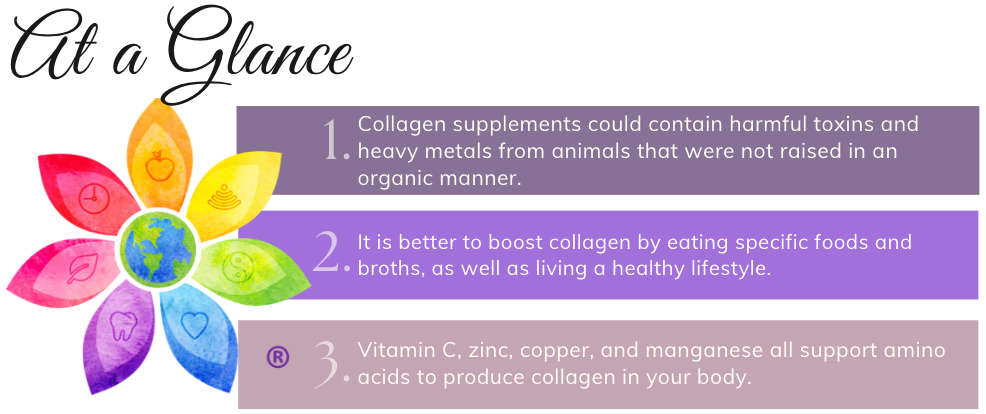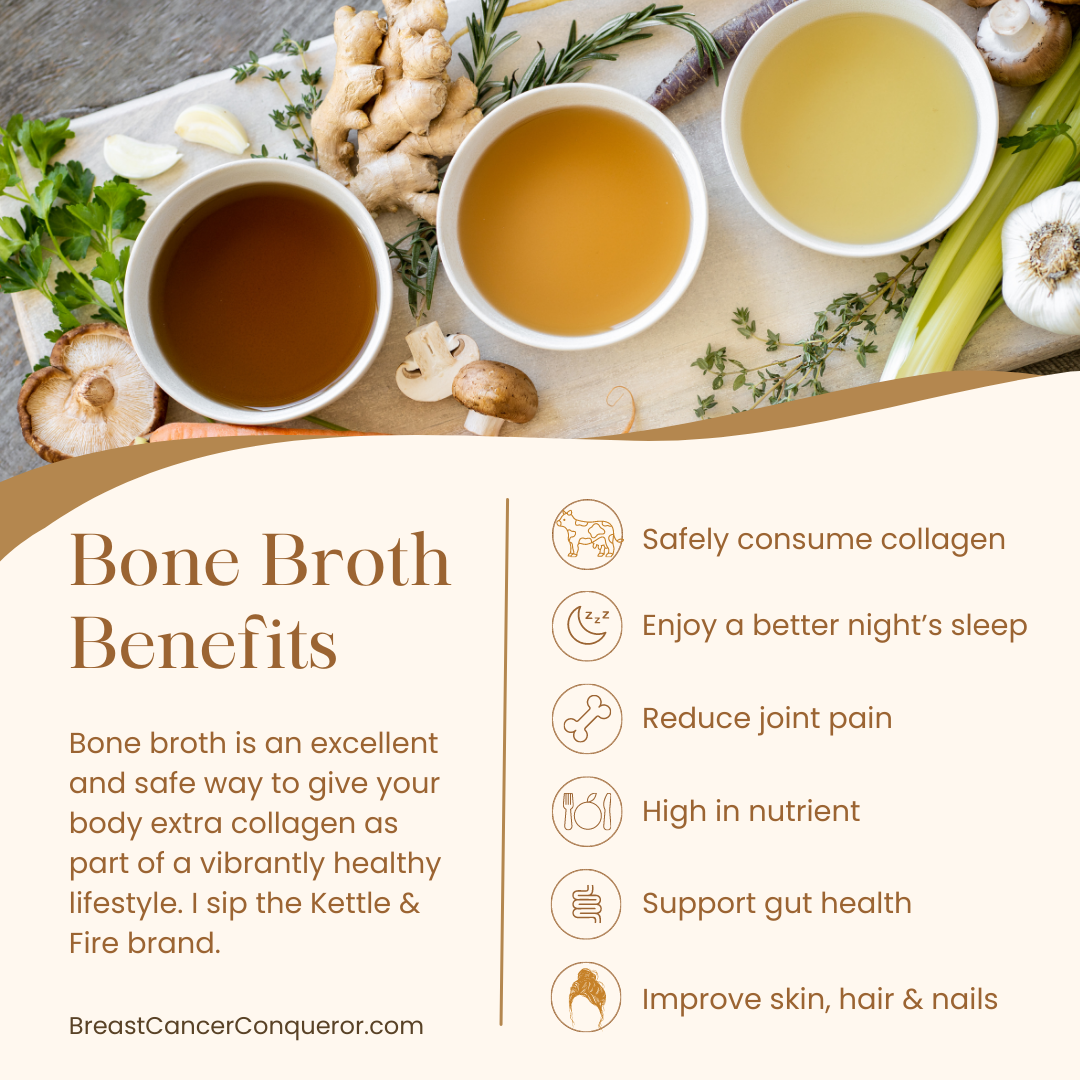

The short answer is: NO. It is much better to get collagen from foods and lifestyle choices.
Allow me to explain…
Collagen 101
Over 1,000 years ago, Hildegard von Bingen discovered extracts from animal tissue could help with joint pain. Jump ahead a few hundred years, collagen kicked off its popularity parade by promising hair, skin, nails, joints, and reverse aging support.
Celebs and collagen supplement packing will tell you…”It’s the fountain of youth for your skin!” “My hair has never looked so luscious!” “My skin is tight like it was 20 years ago!” These praises led to the global collagen market being valued at 9.1 Billion US dollars in 2022. But don’t believe the hype and buy the $87 product promising the fountain of youth. There’s trendy hype, and then there’s hard science.

The science of collagen
Collagen is a group of proteins in your body that provide a fiber-like structure that helps tissues like skin, cartilage, and tendons be strong and resilient. It accounts for 30% of your body’s protein and provides the building blocks for skin, bones, tendons, muscles, ligaments, and other connective tissues. It can also be found in your organs, intestinal lining, and blood vessels.
Your body produces collagen from the amino acids, the most abundant protein in the body. The main amino acids that make collagen are proline, glycine, and hydroxyproline. With the help of vitamin C, zinc, copper, and manganese, these amino acids group together to form protein fibrils in a triple-helix structure.
As you age and do things that increase aging, such as smoking, collagen production slows. For example, harmful environmental exposures (UV rays, pollution, cigarette smoke) can damage collagen fibers. This reduces their thickness and strength, leading to wrinkles. Stress, alcohol, lack of sleep, and extreme exercise are also surefire ways to quickly drop your body’s ability to produce collagen.
Collagen’s roles in your body
Its main role is to provide support, structure, and strength throughout your body.
Specifically, collagen archives this by:
- Giving structure, strength, and elasticity to your skin.
- Playing a role in replacing dead skin cells.
- Helping fibroblasts to form in your dermis (middle skin layer), which helps new cells grow.
- Providing a protective covering for organs.
The toxic side of collagen supplements
Most collagen supplements are made from connective tissue, bones, and other parts of cows, pigs, chickens, and fish. Since most companies are not transparent, you have no idea how these animals were raised and what toxins they ate to grow quickly. Therefore, these supplements could contain harmful toxins and heavy metals. Also, most collagen supplements are not third-party tested nor regulated, so the purity of ingredients is not standardized.
Many studies on the safety and effectiveness of collagen supplements have been funded by the supplement industry. Therefore, the “findings” will have a biased spin to supporting the growth of the collagen industry.
The collagen supplement trend is still relatively new, so the research world is still lacking comprehensive information regarding if collagen supplements can lead to the spread of cancer.
However, there are a few studies and this one published in August of 2022 found that “…high levels of collagen XII can trigger breast cancer cells to spread from the tumor to other parts of the body, a process known as metastasis.” This is because Collagen XII alters the tumor environment to help cancer cells spread. Taking a collagen supplement daily can give people higher levels of collagen than their bodies need and can handle, leading to damaged cells.
Another ongoing study is finding that problems with collagen processing are a primary feature of triple-negative breast cancer (TNBC) tumors, and these issues appear to be particularly exacerbated in breast tissues of African American women as compared to Caucasians. As stated, researching the link between collagen supplements and breast cancer is still in the early stages. However, I do not recommend taking collagen supplements because you don’t the levels of GMOs, toxins, heavy metals, etc. that could come from unhealthy animal growth processes.
Foods that contain collagen and boost production
Foods that contain collagen: 
Cuts of meat such as pot roast, brisket, and chuck steak. However, these cuts should be eaten occasionally and from organically and pasture-raised raised cows. The bones and skin of fresh and saltwater fish also provide straight collagen. Gelatin is also a form of collagen made from animal bones, cartilage, and skin. To eat the gelatin, you must boil it for several hours and then allow the liquid to cool and set.
Dr. V’s recommendation: bone broth. It soothes the soul and is the healthiest way to consume collagen. My go-to brand is Kettle & Fire. They combine marrow bones with premium organic vegetables and filtered water in steel kettles. Their mixture is slow-simmered for 24 hours to ensure enough time for nutrients, collagen, and amino acids to soak into the broth. No additives, antibiotics, hormones, or artificial flavors—none of the bad and all the good!
Foods that boost collagen:
Going back to the science of collagen section, amino acids, zinc, and vitamin C all help boost collagen production in your body.
- Animo acids: Many high-protein foods are believed to nurture collagen production because they contain the amino acids that make collagen. Some good options include fish, eggs, legumes, chicken, and beef.
- Zinc: legumes, meats, nuts, seeds, and whole grains all provide zinc which is required for collagen production.
- Vitamin C: Citrus fruits, berries, leafy greens, bell peppers, and tomatoes provide this essential vitamin for boosting production.
Healthy lifestyle choices that boost collagen production
More than a magic pill, healthy breast lifestyle choices (including your diet) will also help rev up your collagen production.
These healthy choices are recommended by Dr. V and Harvard Health:
- Sun protection: Direct sunlight for about 30 – 60 minutes a day is a great way to boost your vitamin D levels and overall happiness!
- Properly manage stress: I may sound like a broken record, but I can’t emphasize this enough! Chronically high cortisol levels can decrease collagen production, damage cells, and lead to a wide range of diseases. Here’s a great article on relieving stress.
- Avoid smoking and secondhand smoke at all costs! For all the obvious reasons.
- Beauty sleep: No beauty supplements can do more for your mind, soul, and skin than a deep 8+ hour sleep. Here’s an insightful blog on how to truly sleep well.
You are never alone!
Getting a diagnosis can be scary and overwhelming—but it should never be isolating. All of us at the Breast Cancer Conqueror community are here to support and cheer you on! Following us on social media: Facebook, YouTube, and Instagram are great ways to get involved. Working with a private coach will provide a personalized guide throughout your journey. She will provide an empathic listening ear, tailor protocols, and support you with strategize that have worked for women all over the globe.
Conquering Breast Cancer Together Online Program
In addition to our social media, blogs, and coaching programs, we offer virtual summits that you can watch whenever is best for you. CLICK HERE to join us for our online program that teaches you to harmoniously blend natural medicine with conventional care to curate the most effective plan for YOU.
You never have to fear breast cancer again!
